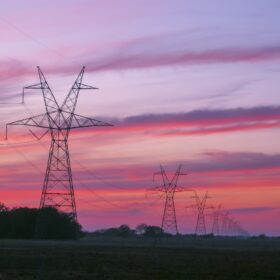Two approaches to prevent queue-jumping by thermal generation
A study from Grid Strategies and ACORE finds evidence that priority transmission access offered by three grid operators has yielded generating portfolios “heavily weighted” to thermal resources. The study favors transmission planning followed by recruitment of projects that can use planned transmission capacity to enter the interconnection queue. A limited non-discriminatory “fast path” could meet near-term reliability needs.
Intermittent solar and wind complement each other for a more stable grid
A study finds combining wind and solar leverages their alternating peak periods, significantly boosting total generation capacity while providing a constant, predictable power curve critical for grid integration.
In Virginia and New Jersey, solar and storage goals include surplus interconnection
Incoming governors in New Jersey and Virginia campaigned on broad clean energy platforms, while Advanced Energy United sees underused points of interconnection as the best solar and storage opportunity in Virginia.
Protecting the grid from extreme weather
IEC Standards help to make the grid more resilient as the impact of climate change intensifies.
SolarEdge stock leaps on Q3 earnings, announces development of datacenter transformer
SolarEdge posted its third consecutive quarter of revenue growth and increased margins. The company announced a partnership with Infineon to produce solid-state transformers designed to power AI datacenters.
Unlimited low-cost energy storage
In its latest monthly for pv magazine, the International Solar Energy Society (ISES) explains how pumped-hydro energy storage combined with PV power generation could provide 24/7 power to data centers.
New York utility aims to expand its flexible interconnection pilot
After operating a 15 MW solar plant with flexible interconnection that requires occasional curtailment but not grid upgrades, Avangrid seeks to expand flexible interconnection to additional portions of its distribution grid.
3D solar tower increases capacity factor 50%, triples solar surface area
Janta Power closed $5.5 million in seed funding to develop its vertical solar tower, with pilot programs already underway in major global airports like Dallas-Fort Worth and Munich International Airport.
PNW data center opts for BESS to jump the interconnection queue
Calibrant Energy will install the system next year at Aligned Data Centers’ Pacific Northwest site in what the companies call the nation’s first battery built to help data centers speed up interconnection.
Energy storage reshapes data center siting amid regulatory pressure
Power cut regulations and slow permitting are driving data centers toward storage-backed, grid-independent designs.















